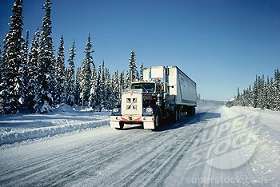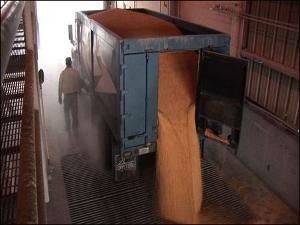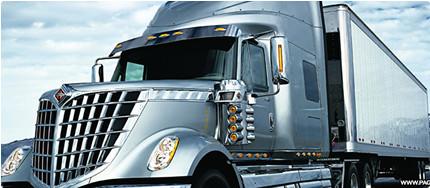Review Questions - Click On The Picture To Begin...

- Military Vehicle Operators
- All of these are exempt
- Firefighting Equipment Operators
- Farm Equipment Operators
Quote From The CDL Manual:
The following vehicle operators are not required to obtain a CDL:
- Farm Equipment Operators - This exemption covers legitimate farm-to-market operations by farmers, not commercial grain haulers.
- Firefighting Equipment Operators - Because most firefighting organizations have extensive initial training and retraining requirements for their equipment operators, requirements for operators of firefighting equipment owned or operated by or for a government agency, when responding to or returning from an emergency, are exempt.
- Military Vehicle Operators - Operators of military vehicles for military purposes are exempt from obtaining a CDL.
- Recreational Vehicle Operators - Recreational vehicle operators, when using the vehicle primarily for personal use, do not need a CDL.
- General Cargo Weight Rating
- Gross Combination Width Rating
- General Contractor Weight Rating
- Gross Combined Weight Rating
Quote From The CDL Manual:
GCWR (Gross Combined Weight Rating) - Value specified by the manufacturer as the GVWR of the power unit plus the GVWR of the towed unit or units, or the combined registered weight of the power unit plus the towed unit(s).
TruckingTruth's Advice:
Be sure you understand the difference between GCWR and GVWR. It's best to memorize the meanings and definitions of both as it will probably show up on the written exam.
- The operator is the spouse of the farm owner
- The farm equipment operator will be traveling further than 150 miles from his or her farm
- The farmer is transporting farm goods to a local market for commercial purposes
- Farm equipment operators are always exempt from obtaining a CDL provided they are transporting farm products, equipment or supplies to or from a farm
Quote From The CDL Manual:
Farm Equipment Operators - This exemption covers legitimate farm-to-market operations by farmers, not commercial grain haulers. CDLs are not required to operate vehicles:
- Controlled and operated by a farmer, a member of the farmer's family or an employee;
- Used to transport farm products, equipment or supplies to or from a farm (including nurseries and aquacultures);
- Used within 150 air miles of the farm; and
- Not used in the operations of a common or contract carrier; and
- Used in nursery or agricultural operations.
NOTE: For the drivers of truck-tractor semitrailers, the farmer, his or her spouse and their children, parents on both sides, brothers and sisters on both sides and their spouses operating a truck-tractor semitrailer and meeting the above criteria also are exempted from the CDL Program. These drivers must be at least age 21, and the vehicle must have Farm plates. These drivers are still required to take the appropriate CDL written, skills and road tests to be licensed.
- Grain Vehicle With Restrictions
- Gross Vehicle Width Rating
- Gross Vehicle Weight Rating
- General Vehicle Without Restrictions
Quote From The CDL Manual:
GVWR (Gross Vehicle Weight Rating) - Value specified by the manufacturer as the maximum loaded weight of a single vehicle or combination of vehicles, or the registered gross weight.
TruckingTruth's Advice:
Be sure to have this memorized and understand how it's different from GCWR (Gross Combination Weight Rating). You'll most likely see a question related to CVWR / GCWR definitions on the written exam.
- Military personnel transporting hazardous materials in a combination vehicle weighing more than 50,001 pounds
- A farmer driving a combination vehicle equipped with air brakes
- A recreational vehicle longer than 35 feet in length
- Driving a vehicle weighing more than 26,001 for commercial purposes across state lines
Quote From The CDL Manual:
The following vehicle operators are not required to obtain a CDL:
Farm Equipment Operators - This exemption covers legitimate farm-to-market operations by farmers, not commercial grain haulers. CDLs are not required to operate vehicles:
- Controlled and operated by a farmer, a member of the farmer's family or an employee;
- Used to transport farm products, equipment or supplies to or from a farm (including nurseries and aquacultures);
- Used within 150 air miles of the farm; and
- Not used in the operations of a common or contract carrier; and
- Used in nursery or agricultural operations.
NOTE: For the drivers of truck-tractor semitrailers, the farmer, his or her spouse and their children, parents on both sides, brothers and sisters on both sides and their spouses operating a truck-tractor semitrailer and meeting the above criteria also are exempted from the CDL Program. These drivers must be at least age 21, and the vehicle must have Farm plates. These drivers are still required to take the appropriate CDL written, skills and road tests to be licensed.
- Firefighting Equipment Operators - Because most firefighting organizations have extensive initial training and retraining requirements for their equipment operators, Illinois waives CDL requirements for operators of firefighting equipment owned or operated by or for a government agency, when responding to or returning from an emergency.
- Military Vehicle Operators - Operators of military vehicles for military purposes are exempt from obtaining a CDL.
- Recreational Vehicle Operators - Recreational vehicle operators, when using the vehicle primarily for personal use, do not need a CDL.
A CDL must be obtained by the driver of any of the following vehicles:
- Any combination of vehicles with a gross combination weight rating (GCWR) of 26,001 or more pounds, providing the gross vehicle weight rating (GVWR) of the vehicle being towed is in excess of 10,000 pounds.
- Any single vehicle with a GVWR of 26,001 or more pounds, or any such vehicle towing another not in excess of 10,000 pounds.
- Any vehicle, regardless of size, designed to transport 16 or more persons, including the driver.
- Any vehicle required by federal regulations to be placarded while transporting hazardous materials.
- Any single vehicle with a GVWR of 26,001 pounds or more pounds
- Any combination of vehicles with a gross combination weight rating (GCWR) of 20,001 pounds
- Recreational vehicles exceeding 22,001 pounds.
- Any vehicle, regardless of size, designed to transport up to 14 persons, including the driver
Quote From The CDL Manual:
A CDL must be obtained by the driver of any of the following vehicles:
- Any combination of vehicles with a gross combination weight rating (GCWR)** of 26,001 or more pounds, providing the gross vehicle weight rating (GVWR)* of the vehicle being towed is in excess of 10,000 pounds.
- Any single vehicle with a GVWR of 26,001 or more pounds, or any such vehicle towing another not in excess of 10,000 pounds.
- Any vehicle, regardless of size, designed to transport 16 or more persons, including the driver.
- Any vehicle required by federal regulations to be placarded while transporting hazardous materials.
TruckingTruth's Advice:
Recreational Vehicles do not require a CDL
- The military vehicle is more than 26,001 pounds
- The military vehicle exceeds 80,000 pounds
- The military vehicle is being driven on public roadways
- Military Vehicle Operators never need to obtain a CDL as long as the vehicle is being used for military purposes
Quote From The CDL Manual:
Military Vehicle Operators - Operators of military vehicles for military purposes are exempt from obtaining a CDL.









 TT On Facebook
TT On Facebook